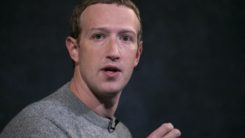With so many possible story angles to dedicate to the candidates themselves, it would be tempting to ignore the fatally flawed format of Sunday night’s presidential debate.
In these echo-chambered times, debates are one of the few moments left in American politics when tens of millions of voters tune in to the same stream of information. They aren’t just watching the same event unfold; they are doing so with exactly the same form of intermediation. That lasts 90 minutes and not a moment longer.
Case in point: as I was watching the debate in the common area of my building, another tenant passed by and strongly promoted the follow-up commentary on OAN, a conservative online news service the left-leaning millennial bunch gathered in front of the TV had never even heard of.
So the debate’s format matters a great deal.
But the town hall fails on three fronts. First: the debate rests on the preposterous assumption that the people in the room are legitimately undecided voters; second, it makes aggressive follow-up questions from moderators look out of place; finally, it completely ignores the need for fact-checking.
Start with the composition of the town hall participants, allegedly composed of uncommitted voters. Surely no voter would entertain voting for Trump if their question is “with Islamophobia on the rise, how will you help people like me deal with the consequences of being labeled as a threat to the country after the election is over?”
To be clear: this doesn’t make the question any less fundamental. But it does pierce the conceit of the questioners representing the truly undecided. The rest of the audience didn’t even pretend to be uncommitted, interrupting the debate with cheers and claps five times.
Next, the focus on getting questions from the public meant that any vigorous follow-up from the moderators looked out of place. ABC News correspondent and moderator Martha Raddatz pushed back hard on Trump’s claim that announcing an upcoming attack on ISIS forces in Mosul meant America was “stupid.”
Raddatz noted that there were reasons the military would take that option, namely that it could save civilian lives. While I was personally cheered by this intervention, the same can’t be said of conservative commentators, even in the no-Trump camp.
Shouldn’t this response have come from Hillary Clinton, they rightly note? This wasn’t a point of fact, it was an alternative interpretation of motive. In a debate format conceived to empower the moderators, this could have been a great back-and-forth. There would also have been time to tackle Clinton’s logic equally forcefully on another topic. In a town hall format, this burst of rational but aggressive questioning looked like playing favorites.
Finally, the town hall format kills any hope for meaningful fact-checking. When Trump repeated that he was against the invasion of Iraq, Raddatz premised her next question with “there’s been lots of fact-checking on that” and left it at that. While a useful flag for curious voters to find out more, this is not an effective counter to a widely debunked assertion.
But with the focus on voters’ questions, rather than candidates’ answers, there is no space to deconstruct blatant inaccuracies.
Many other points of fact could have been raised by the moderators. One that struck me was how they hoped to address the potential terrorism risk posed by refugees from Syria. Both candidates espoused a rigorous selection process. Between Trump’s “extreme vetting” and Clinton’s “vetting that is as tough as it needs to be,” voters at home would have not known that the current process is a triumph of rules that can take up to two years. In a debate focused on facts, moderators should be able to show what a policy currently is to the public and ask candidates how precisely they would change it.
With so much riding on the debates and such contentious candidates on stage, no format will ever please everyone. And handed a broken format, the moderators were at least able to split the candidates’ speaking time quite fairly.
Ultimately, the blame lies on the Commission on Presidential Debates. Rather than spend time on the trendy window-dressing of social media lingo (Hey kids! We said “Facebook” five times), their primary focus should have been on elevating the role of accuracy in debates.







